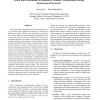105 search results - page 8 / 21 » Distributed Checkpointing Using Synchronized Clocks |
118
Voted
PODC
1996
ACM
15 years 6 months ago
1996
ACM
We address the problem of the impossibility of implementing synchronous fault-tolerant service specifications in asynchronous distributed systems. We introduce a method for weaken...
EUC
2004
Springer
15 years 7 months ago
2004
Springer
Every computer needs a timer mechanism to keep track of current time and also for various accounting purposes such as calculating the time spent by a process in CPU utilization, di...
112
click to vote
ICDCSW
2002
IEEE
15 years 7 months ago
2002
IEEE
Time-driven Key Sequencing (TKS) is a key management technique that synchronizes the session key used by a set of communicating principals based on time of day. This relatively lo...
120
click to vote
ISCA
2002
IEEE
15 years 7 months ago
2002
IEEE
Due to shrinking technologies and increasing design sizes, it is becoming more difficult and expensive to distribute a global clock signal with low skew throughout a processor di...
111
click to vote
IPSN
2010
Springer
15 years 9 months ago
2010
Springer
We present Virtual High-resolution Time (VHT), a powerproportional time-keeping service that offers a baseline power draw of a low-speed clock (e.g. 32 kHz crystal), but provides...

